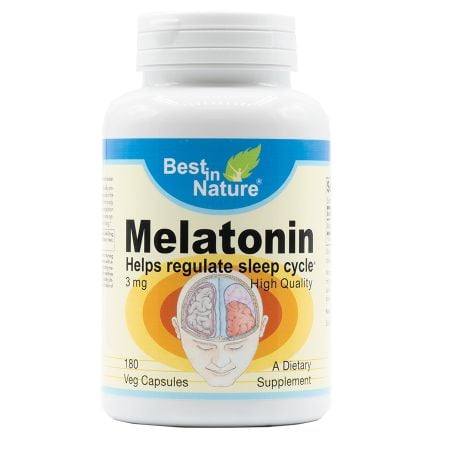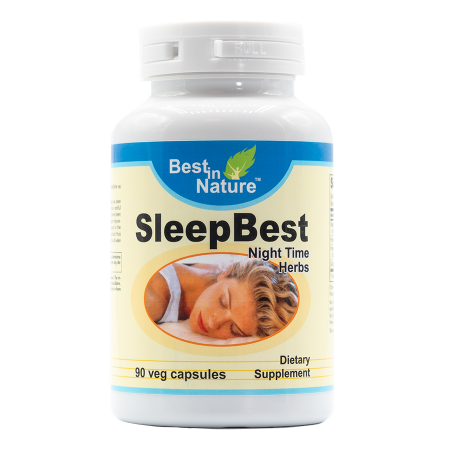
Reviewed and Updated: May 6th, 2025
One of the best things you can do for your health is getting consistent, restful sleep. Many things like late work nights, inconsistent schedules and travel can make this a difficult proposition. While many people recommend melatonin, you might have questions about what it is, whether it’s safe to take and what the right dosage is. For answers to all of these and more, read on.
What is Melatonin, and how does it work?
Melatonin is a hormone naturally produced by the human brain in response to darkness. The hormone helps time your body’s circadian rhythms (your body’s 24-hour internal clock) and helps you fall asleep. While research suggests the hormone may play other vital roles in the body other than sleep, its effects are not fully understood yet. Melatonin dietary supplements can be extracted and composed from microorganisms or animals, but most of the time, they’re synthetically made.

[Related: OMEGA-3 DEFICIENCY SYMPTOMS AND HOW TO MAKE SURE YOU'RE GETTING ENOUGH]
Benefits of Melatonin
Melatonin supplements can help alleviate certain conditions like delayed sleep-wake phase disorder, jet lag, insomnia, anxiety before and after surgery, mood regulation, and certain sleep disorders in children.
Melatonin may also help:
- Reduce seasonal depression
- Promote eye health
- Alleviate gastroesophageal reflux disease (GERD)
- Increase human growth hormones (HGH)
How Much Melatonin Should I Take?
When taking melatonin, it is advisable to start with the smallest recommended melatonin dosage for your age. Slowly increase your dose until you arrive at a dose that helps you sleep without resulting in any side effects. 0.5 mg to 3 mg of melatonin is a safe starting dose for adults. Lower doses starting with 0.1 mg should be safe and effective for older adults. Unless a doctor recommends it, children should not take melatonin. Over-the-counter melatonin usually comes in standard dosages like 1 mg or 5 mg. You can create a smaller starting dose using a pill-cutter to cut the tablets in quarters or halves.
Melatonin Dosage for Adults
If you’re experiencing short-term sleep difficulties, research indicates that taking melatonin in low doses is an effective way to relieve these troubles. Recommended melatonin dosage range from 0.5mg up to 3 mg to treat jet lag or encourage sleep. Short term in this case is about 1-2 months after which one should evaluate if they have improved sleep after getting off of melatonin. It can also be restarted later on.
Melatonin Dosage for Children
Along with the potential side effects we’ve discussed above, there are other factors to keep in mind when giving melatonin to children. Melatonin supplements should be relatively safe for most healthy children short term, but not enough research addresses the long-term effects of children using melatonin. Since melatonin is a hormone, melatonin supplements carry the possibility of affecting hormonal development such as menstrual cycles, puberty, and hormone prolactin overproduction. However, none of these effects are confirmed.

Potential melatonin supplement side effects in children are reported to be typically mild and include:
- Headache
- Increased bedwetting in the evening
- Drowsiness
- Agitation
- Dizziness
Melatonin Dosage for Older Adults
As we age, our melatonin levels naturally decline, resulting in less regular sleep-wake cycles for many older adults. Lower natural levels of melatonin mean that older adults are more sensitive to supplemental melatonin. Consider this meta-analysis of 16 studies, where older adults aged 55 to 77 years old were given melatonin dosages between 0.1 mg and 50 mg per kilogram. In all of the studies, the melatonin levels stayed higher and for a more extended period among older adults compared to younger adults, causing more drowsiness during the daytime. The more melatonin someone took, the more pronounced the effects were.
The study prompted researchers to recommend that older adults begin with the lowest possible dose of melatonin. Lower doses may help older adults sleep more restfully without interfering with their circadian rhythms and prolonging drowsiness. The American Academy of Sleep Medicine advises older adults with dementia to avoid melatonin due to increased risk of falls and other adverse events.
.
Other Questions About Melatonin
When Should I Take Melatonin?
The optimal time to take melatonin is about 30 minutes to 1 hour before going to bed. Your brain increases melatonin production naturally around one to two hours before sleep, so taking supplemental melatonin around this time may aid the process.
Can I Take Melatonin With Alcohol?
Since alcohol can disrupt your natural melatonin levels and sleep quality, you should not mix melatonin with alcohol.
Can I Take Melatonin With Caffeine?
Caffeine is a stimulant that already interrupts your sleep-wake cycle and should not be paired with melatonin since it may also decrease the effects of melatonin.
Can You Overdose on Melatonin?
Overdosing on melatonin doesn’t have any serious repercussions, but there are side effects. People have different sensitivities to melatonin, so finding an appropriate dosage is highly individual. The most common effects of an overdose include drowsiness, dizziness, fatigue, headache, confusion, nightmares, hypotension, tachycardia, and hypothermia. Treatment consists of supportive care and monitoring of vital signs.

Symptoms of a Melatonin Overdose
- Daytime drowsiness
- Reduced body temperature
- Reduced focus and concentration (brain fog)
- Higher prolactin levels
[Related: THE BENEFITS OF LOW-IMPACT EXERCISE FOR YOUR JOINTS AND MORE]
When You Should Consult With Your Doctor About Melatonin
It’s always recommended to consult with your doctor before taking any sleep aid, even over-the-counter ones like melatonin. Your doctor can best advise you on the proper dosage based on your needs and personal medical history. They can also let you know whether melatonin may conflict with any medications you’re taking. Your risk of side effects when supplementing melatonin may be multiplied by certain medications and health conditions.
Be sure to talk to your doctor before taking melatonin if you’re on any of the following medications:
- Epilepsy medications (anticonvulsants) - May be less effective
- Blood-thinning medications - May increase your chance for bleeding
- Diabetes medications - Melatonin use may impact blood sugar levels
- Immunosuppressants - Melatonin can potentially disrupt drug function
- Contraceptive drugs - Different forms of birth control may raise the risk of side effects from melatonin
Certain types of people may be more sensitive to melatonin, and should consult their doctor before taking it:
- People with dementia
- Children
- People with epilepsy
- People with depression
- Shift workers
- Pregnant or breastfeeding women
Research into the potential use cases and benefits of melatonin is still evolving, and its long-term effects are still unclear. Melatonin may aid sleep and alleviate sleep problems for many people when used on a short-term basis, while for others it may have no impact on sleep or cause side effects. If your sleep problems persist or worsen after taking melatonin, you may want to consult with a doctor. They can work with you to find other ways to improve your sleep, such as changes to diet and exercise, better sleep hygiene, or cognitive-behavioral therapy for insomnia.
Is It Safe to Take Melatonin Every Night?
The National Center for Complementary and Integrative Health (NCCIH) reports that short-term use of melatonin supplements should be safe for most adults and children. However, information on the effects of supplementing melatonin long-term is limited. Certain studies hint that long-term melatonin use in adults may result in mild side effects, while long-term melatonin use in children requires more research.
[Related: THE 9 MOST IMPORTANT VITAMINS AND MINERALS FOR BONE HEALTH]

Bottom Line
Melatonin is safe and effective for those who have short-term sleep problems while its long-term effects aren’t fully understood. Even though it’s generally safe, you should still talk to your physician before beginning a supplemental regimen. They’ll be able to confirm if it's safe for you given your medical history and medications you’re taking as well as your recommended dosage. While melatonin is sold in 1 mg to 5 mg capsules or gummies, you can halve them to get your ideal amount. If you decide melatonin is right for you, consider melatonin from Best in Nature.
This article is provided for informational purposes only and is not intended to be used as medical advice. If you have immediate concerns about your health, please seek the help of your physician.
© 2021 Best in Nature All rights reserved








Validate your login
Sign In
Create New Account